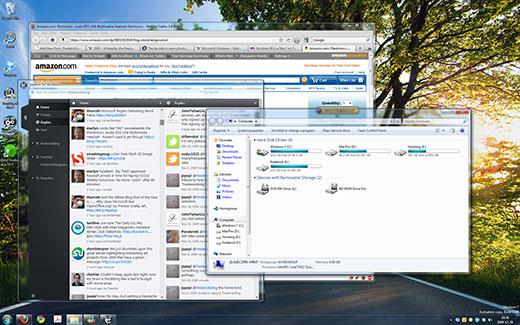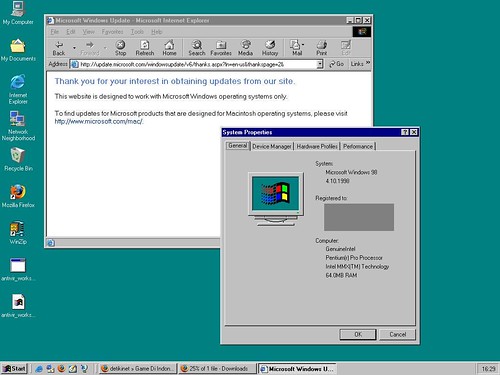It’s the end of another year and the end of a ground-breaking decade. Let’s look back at what’s been accomplished in the years of 2000–2009, focusing on technology.
Technology
Windows has entered a new era
The decade—indeed, the century—began with Windows 2000, which I consider the first great version of the operating system. XP was the version that brought widespread success, and people just seem to refuse to upgrade; even today, almost three quarters of the computers on the net are on XP.
Despite the dismal failure of Windows Vista, it too brought change, which was followed by the enhancements of Windows 7. Compare my desktop today to the ugly screens of a decade ago:
Apple deserves an honourable mention for the ground-breaking work they’ve done on the Mac, elevating it to a newly trendy status.
Portable media players have completely changed
A decade ago, CD players and tape-based Walkmans were still the norm for ‘portable’ audio players. The iPod, launched in 2001, entirely changed the game. (I suppose this and the iPhone were the “comeback of the decade”.) It was no longer a device that played removable media. That was followed by thousands of other portable media players, to which the public generally refers inaccurately as “MP3 players”, reflecting the popularity of the 15-year-old MP3 format that has also been notorious for illegal file sharing (see below).
Cell phones and mobile devices have become ubiquitous

In China, about 739 million people have cell phones; that’s more than there are Internet users in China (which is about 360 million).
Mobile devices have become truly powerful. The iPhone, purportedly the most popular cell phone of 2009, is one of the biggest platforms for software development. And it has a touch screen. RIM’s BlackBerry, initially launched in 1999, is the most popular smartphone among business users.
Ordinary people begin to embrace ultra-portable netbooks for lightweight computing. The move to mobile is probably the most noticeable trend in end-user gadgetry in this decade.
Illegal file sharing has emerged
I don’t personally think of torrenting itself as a major problem, and it’s difficult to sympathize with big companies when the RIAA is being stupid. At the same time, it’s pretty easy to see how having hundreds of movies, TV shows and music albums distributed through torrents can take away from earnings for content producers. (Some dispute this and argue that those who pirate movies and TV shows are those who will purchase related memorabilia or boxed sets.)
In any case, it is virtually undisputed that new technologies have made distribution of such content much easier. In the previous decade, pretty much everyone was on dial-up Internet and only the students at universities with blazing connections were able to do it (think about the controversial Napster).
YouTube happened
YouTube and hundreds of other video sites have revolutionized the way we watch video. What used to be distributed on tapes and discs has moved onto the Internet in a way that allows ordinary folks—not videophiles or geeks—to share their multimedia with the world.
YouTube is also the icon of the so-called Web 2.0, which is oriented on user-generated content. (Flickr deserves an honourable mention for high quality pictures, just like Vimeo for high class videos.) It has made it possible for teens with crazy personalities and high-pitched edited voices, artists who post music videos, and crazy dancers who travel the world to reach out to a vast audience. Above all, it’s a legitimate new form of entertainment.
Following the success of online video, major content producers began to license music for online distribution (think Pandora or Last.fm, not to mention Internet radio) as well as movies and TV shows (think Hulu).
http://www.youtube.com/watch?v=dcLMH8pwusw
Open source projects have become worthy challengers
 More than a decade ago, in 1996, the Apache HTTP server became the most popular web server in use; today it has surpassed 100 million web sites served.
More than a decade ago, in 1996, the Apache HTTP server became the most popular web server in use; today it has surpassed 100 million web sites served.
Mozilla Firefox, having risen out of the ashes of the Netscape browser, although not the most widely used browser in the world (it’s 2nd), is apparently used by 32% of the market analyzed by StatCounter.
While I still use Microsoft Office, OpenOffice.org is also a notable alternative to the proprietary and dominant office suite, especially on non-Windows operating systems.
And then there are the programs used by geeks, like the Eclipse IDE or Aptana Studio, that are depended upon. (For all of you multimedia geeks, there are open source programs that do the job much better than their closed source counterparts; think about Handbrake, VLC…)
Businesses can now also depend on open source projects like Sugar CRM that build their revenue model around support and premium features.
News has moved onto the Web
My primary news source now is the Web. Google News is one of my frequently visited sites, as it is a fantastic aggregator of headlines. I subscribe to e-mail summaries from the Toronto Star and breaking news alerts from the New York Times. ArsTechnica and TechCrunch are my sources for technology-related news, and occasionally Mashable and Neowin. Those pesky short links in the tweets of people I follow also make for engaging news articles.
Wikipedia happened
At the beginning of this decade, I was researching in books and print encyclopedias. The conventional wisdom today of “just Google it” didn’t work so well then. And certainly there wasn’t a Wikipedia for the wealth of human knowledge that it now contains.
Today, I can near-instantly read up on the history of Wal-Mart or read up on the Beslan school hostage crisis and its media coverage. If I truly need it, Wikipedia connects with Wikisource, the free library and Wikibooks where I can read Anna Karenina online (and I wouldn’t, because Constance Garnett’s translations are really lacking).
It’s truly amazing that the sum of all human knowledge can be collaboratively archived and updated through the likes of Wikipedia. Perhaps they need your support this holiday season!
What do you think? Did I miss out on something big that happened in this decade in the world of tech? Write a comment!
(I did, however, intentionally exclude social networking—i.e. Facebook—because I don’t think it’s been revolutionary in any major way. Sure, it has connected people in new ways, but it’s still relatively fresh and more time is needed to see where it goes. Similarly, I omitted touch because it hasn’t entirely caught on yet; tablet PCs were a dismal failure a few years ago and I haven’t yet seen their widespread success. Furthermore, I omitted cloud computing because it doesn’t directly affect a large number of people. Feel free to disagree with me in the comments.)
Worldly Matters
I think September 11, 2001 marked the start of a new era of warfare and international affairs. The terrorist attacks, inasmuch as they have been abused to justify ill-advised battles, did shock the world.
I recommend you head over to the Big Picture where you’ll be dazzled by splendid photos of this decade, including commentaries on the World Trade Center attacks and war. And dozens of other things like natural disasters (remember Katrina, or the Sichuan earthquake?), the Beijing Olympics, and terrorist attacks in London.
2009 has been a fantastic year. I look forward to the future.
Happy holidays and all the best in 2010!





Блог супер, буду рекомендовать друзьям!